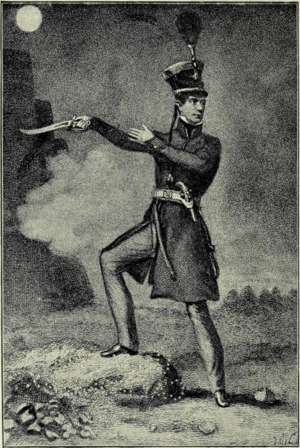John Shipp (British Army officer) facts for kids
John Shipp (born March 1784 – died 1834) was a brave British soldier and writer. He is famous for his life story, which was published in books called memoirs. These books were very popular.
John Shipp started his army journey when he was just ten years old, as a drummer boy. He was so skilled and well-behaved that he earned a special promotion twice. This promotion, called a "commission," allowed him to become an officer. He eventually reached the rank of lieutenant in the 87th Regiment.
The Times newspaper once wrote about his memoirs. They said that for someone to earn an officer's rank twice after starting as a regular soldier was "unique" in the history of the British army. This shows how special his achievements were.
Contents
Early Life and Joining the Army
John Shipp was born in Saxmundham. His father was a marine, which is a type of soldier who serves on ships. John loved the idea of being in the military from a very young age.
Sadly, his mother died when he was young, and his older brother was lost at sea. John ended up in a poorhouse, which was a place for people who had nowhere else to go. He was sent to work for a farmer who treated him badly. To escape this difficult life, John joined the army as a boy on January 17, 1797. He was only 12 years old.
John Shipp's Military Career
John Shipp joined the 22nd (Cheshire) Regiment of Foot. Thanks to a kind captain, he learned to read and write. He served in the Channel Islands and at the Cape of Good Hope. Then, he sailed to India.
In India, he became a sergeant in a special group called the grenadier company. He fought against the Mahrattas (a group in India) under a leader named Lord Lake. John was very brave during battles. He was one of the first soldiers to attack the fort of Deig in 1804. He also led the charge three times in difficult attacks on Bhurtpore in 1805.
He was badly hurt during these battles. But because of his courage, Lord Lake rewarded him with a promotion to ensign in the 65th foot. Soon after, he became a lieutenant in the 76th foot.
Challenges and Unique Achievements
After serving for two and a half more years, John Shipp returned home. He had to sell his officer's rank to pay off his debts. This was a common practice at the time.
After a short time, he found himself in London with no money. So, he decided to join the army again, this time as a private soldier. He went back to India with the 24th Light Dragoons. By 1812, he had worked his way up to become a regimental sergeant-major.
In 1815, another important leader, Francis Rawdon Hastings, promoted him back to an ensign in the 87th Prince's own Irish fusiliers. This meant John Shipp had done something amazing: he had earned an officer's rank twice after starting as a regular soldier. And he did all this before he was 32 years old!
Bravery in Later Wars
John Shipp continued to show great bravery. He fought in the second campaign of the Ghoorka war. He was especially noted for a one-on-one fight with an enemy leader near Muckwanpore.
He also served with a large army under the Marquis of Hastings during the Mahratta and Pindaree war (1817–1818). He was promoted to lieutenant in 1821.
Leaving the Army
John Shipp was very popular in his regiment because of his courage. However, in 1822, while in Calcutta, he faced some trouble. He made some bad decisions related to horse racing bets. He also wrote some things about a superior officer that caused problems.
Because of this, he was removed from the army by a military court in 1823. But the court also recognized his past service and wounds. They said he had always been a good officer and a gentleman. When he left the army, the East India Company gave him a pension of £50 a year. He then settled near Ealing in England.
Life After the Army
After leaving the army, John Shipp started writing about his experiences. His autobiography, published in 1829, told his life story. It covered his youth, his military career, and his thoughts on everything he had seen. These books were reprinted many times.
In 1831, he wrote another book called Flogging and its Substitute: a Voice from the Ranks. In this book, he strongly spoke out against the harsh punishments used in the army, like the "cat o' nine tails." He believed these punishments did more harm than good. His ideas were very influential, and many of his suggestions were later adopted by the military.
In 1830, John Shipp was offered a job as an inspector for the new police force in London. Later, he became the superintendent of the night watch in Liverpool. In 1833, he was chosen to be the master of the workhouse in Liverpool, where he was highly respected.
John Shipp passed away in Liverpool on February 27, 1834, at the age of 50. He was comfortable financially and left behind a wife and children.
John Shipp's Writings
Besides his famous memoirs, John Shipp also wrote other books:
- The Military Bijou, or the Contents of a Soldier's Knapsack (1831)
- The Eastern Story Teller: a Collection of Indian Tales (1832)
- The Soldier's Friend (1833)
He also wrote two plays: The Shepherdess of Aranville, or Father and Daughter and The Maniac of the Pyrenees.
 | Laphonza Butler |
 | Daisy Bates |
 | Elizabeth Piper Ensley |


